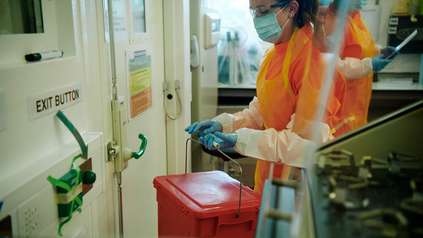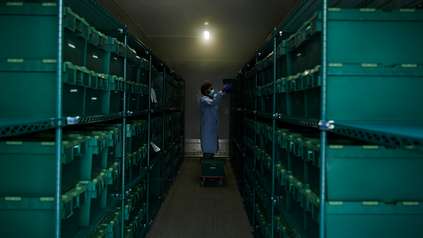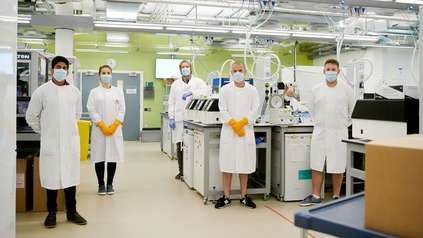Wellcome Sanger Institute recognised as Charity Times finalist for outstanding contribution to pandemic response
Last night (9th September 2021), the Wellcome Sanger Institute was recognised for its outstanding service – as a finalist in the annual Charity Times awards. The Institute was a finalist in the ‘Charity of the Year’ category for organisations with an income over £10 million. Staff were credited by the judges for their dedication, hard work and excellence over the past year as they worked to sequence the genomes of hundreds of thousands of coronavirus samples.
In early March 2020, the Sanger Institute helped found the COVID-19 Genomics UK Consortium (COG-UK). This partnership of NHS and academic organisations working together with UK Public Health Agencies was built in a matter of weeks. The Sanger Institute, with its world-leading facilities, became the genome sequencing hub for the national consortium. The focus of the Institute pivoted, and senior leadership set the objective to deliver rapid, large-scale and high-quality genome sequencing of the novel coronavirus, SARS-CoV-2. The aim was to provide genomic data to help inform the UK’s public health agencies decision-making in response to the COVID pandemic.
In the first two weeks of March 2020, a strategy to sequence coronavirus samples was planned and implemented. Staff were redeployed from previous roles, services were configured and systems were built. In a matter of weeks, pipelines for the flow of samples and data from the NHS and national Lighthouse Lab testing centres, through the Institute and out to public databases were up and running. Over the year, processes were streamlined and improved, and new laboratories were built as capacity was increased. In 12 months from March 2020, Sanger staff handled over 20 million COVID test samples. The Institute has now sequenced over 597,000 coronavirus genomes – around half of the UK’s total and one fifth of the global total.
The Institute currently has capacity to sequence 50,000 virus genome samples a week with turnaround times averaging seven days from swab to analysis-ready data for immediate use by NHS Test & Trace, Public Health England (PHE), Sanger researchers and their partners in COG-UK. These data are made available globally as part of the world’s response to SARS-CoV-2. Currently with the combined efforts of NHS Labs, PHE, Sanger and COG-UK partners, coronavirus genomes are being sequenced at a rate and volume that is high enough to support day-to-day public health decision making. This has never before been possible on a national scale for any disease, anywhere in the world.
The data generated have been used in hundreds of scientific studies into the virus, including its transmission in multiple settings. Researchers have used the data to study the evolution of the virus and identify new variants.
“Sanger’s hard-working staff deserve recognition for their incredible work over the last year. This has truly been a monumental team effort, including scientists, students, technicians, engineers, software developers, data analysts, informaticians, managers, porters, procurement, security, health and safety, communications, HR, finance and many others. They have built and delivered a world-first in national-scale genomic sequencing and analysis, under challenging conditions as the pandemic has progressed. I would like to offer a sincere thank you to everyone involved.”
Dr Cordelia Langford, Director of Scientific Operations at the Sanger Institute
“Our remarkable staff have clearly demonstrated the value of ongoing genomic surveillance of disease for public health. Sanger’s sequencing effort has helped identify sources of outbreaks, dynamics of transmission plus coronavirus ‘variants of interest’, and ‘variants of concern’ – which inform public health responses and will inform the development of vaccines and vaccine boosters.”
Professor Sir Mike Stratton, Director of the Sanger Institute





